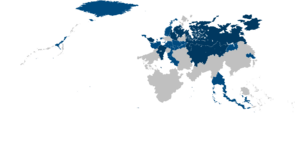Assembly of Nations
Assembly of Nations | |
|---|---|
 Map showing the members states of the Assembly of Nations | |
| Headquarters | Köpenick, Königsreh (international territory) |
| Official languages | |
| Type | Intergovernmental organization |
| Membership | 20 member states |
| Leaders | |
| X | |
| X | |
| Thorsten Reiner | |
| X | |
| Establishment | |
• Treaty of Lehpold signed | 10 March 1917 |
• Charter ratified | 1 December 1917 |
• First Great Council meeting | 1 January 1920 |
Website www.an.org www.an.int | |
The Assembly of Nations (AN or sometimes AoN or AON) is an intergovernmental organization established to provide and maintain international peace and security, developing close relations among member states, achieving widespread international co-operation, and being a forum for the diplomatic interaction between nations. It was founded after the Great War during the Treaty of Lehpold, with its aim of preventing any future wars on the scale of the Great War, and evolved into an organization dealing with maintaining international peace and security, protecting human rights, providing humanitarian aid, promoting sustainable development, and upholding international law. Its headquarters, with all AN territories as subjects to a status of extraterritoriality, is in Köpenick, Königsreh, and it has other main offices in X, X.
The AN is the largest, most familiar, most internationally represented and most powerful intergovernmental organization in the world. Its specialised agencies include the UPESCH, X. At its founding, the AN had X member states. As of 2020, there are now 20, all recognized countries.
History
Aftermath of the Great War
Role in the Melasian Crisis
Great Game
Contemporary period
Structure
AN Security Council
The permanent members of the Assembly of Nations Security Council are the six states which are given a permanent seat in the Security Council by the Treaty of Lehpold of 1917 and further additional permissions by the AN Assembly throughout its history. These states are: the Commonwealth of Albeinland, the Kingdom of Cuthland-Waldrich (formerly the Cuthish State), Federation of Central Pamiran Republics, the Kingdom of Lavaria, the Crowned Republic of Mascylla (formerly the Mascyllary Kingdom), and the Federation of Valimia. Albeinland, Lavaria, and Mascylla were the principal members and allies of the Armala Coalition in the Great War, as well as its victors. The other three were granted permanent seats as part of the Treaty of X, diplomatically negotiating the political outcomes of the Melasian Crisis. Decisions are made upon the plurality vote of the six members, in which for a binding decision two-thirds must approve; a power of veto does not exist.
| Country | Current state representation | Former state representation | Current executive leaders | Current representative |
|---|---|---|---|---|
| — | — | — | ||
| Monarch: Edwin IV Foresitters: Clifford Goodwin and Ale Dykstra |
— | |||
| — | — | — | ||
| — | King: Alberto Salazar I Prime Minister: Adriano Mafra de Chagas |
— | ||
| Queen: Dorothea I Prime Minister: Thomas Falkner |
Leonard Hennig | |||
| — | President: Seppo Toivalo Prime Minister: Katariina Järvenpää |
— |
AN Assembly
AN Secretariat
International Court of Justice
Membership
Member states
| Flag | Country | Date of admission | Further role in the AN |
|---|---|---|---|
| Albeinland | X | ||
| Cuthland-Waldrich | X | ||
| Dulebia | X | ||
| Erytheria | X | ||
| Kodesh | X | ||
| Lavaria | X | ||
| Lilienburg | 10 March 1917 | ||
| Mascylla | 10 March 1917 | ||
| Ochoccola | X | ||
| Temaria | X | ||
| Valimia | X |


